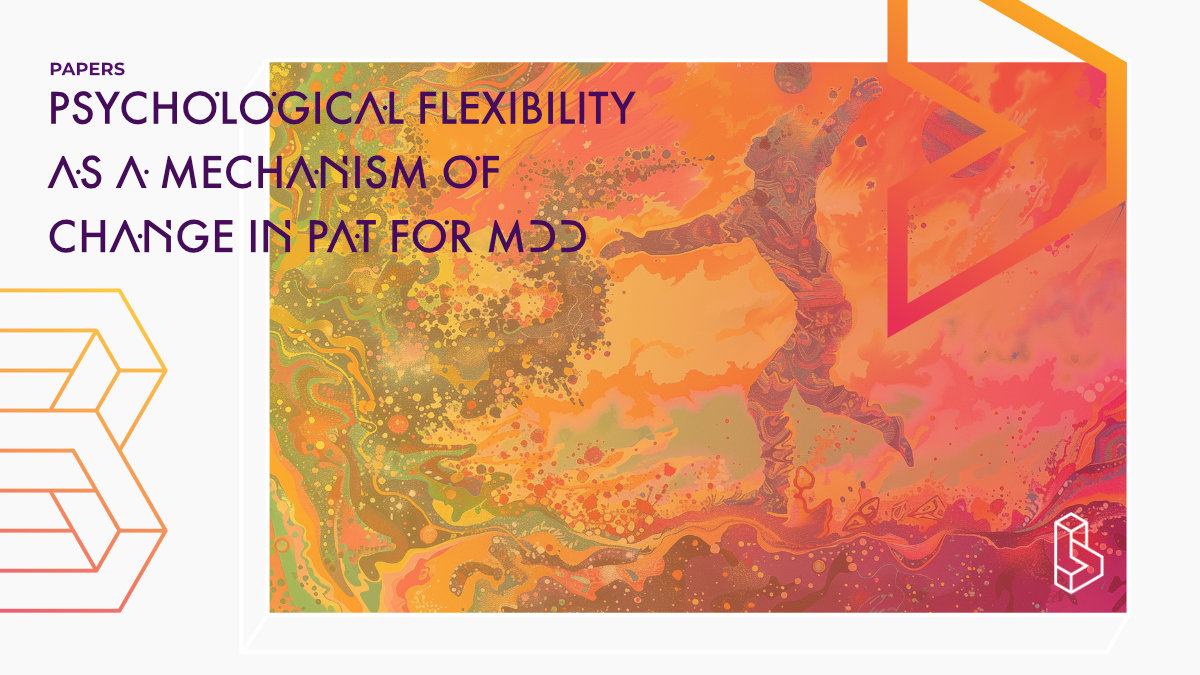This re-analysis of a single-blind, placebo-controlled study (n=19) of psilocybin (21mg/70kg) in combination with therapy (ACT, 8x) finds that psychological flexibility, mindfulness, and living according to one’s values improved after psilocybin and stayed better through the 16-week study period. It also shows that greater psychological flexibility and experiential acceptance were linked with lower depression scores after psilocybin.
Abstract of Psychological flexibility as a mechanism of change in psilocybin-assisted therapy for major depression
“Several phase II studies have demonstrated that psilocybin-assisted therapy shows therapeutic potential across a spectrum of neuropsychiatric conditions, including major depressive disorder (MDD). However, the mechanisms underlying its often persisting beneficial effects remain unclear. Observational research suggests that improvements in psychological flexibility may mediate therapeutic effects. However, no psychedelic trials to date have substantiated this finding in a clinical sample. In an exploratory placebo-controlled, within-subject, fixed-order study, individuals with moderate to severe MDD were administered placebo (n = 19) followed by psilocybin (0.3 mg/kg) (n = 15) 4 weeks later. Dosing sessions were embedded within a manualized psychotherapy that incorporated principles of Acceptance and Commitment Therapy. Depression severity, psychological flexibility, mindfulness, and values-congruent living were measured over a 16-weeks study period. Psychological flexibility, several facets of mindfulness, and values-congruent living significantly improved following psilocybin and were maintained through week 16. Additionally, improvements in psychological flexibility and experiential acceptance were strongly associated with reductions in depression severity following psilocybin. These findings support the theoretical premise of integrating psilocybin treatment with psychotherapeutic platforms that target psychological flexibility and add to emerging evidence that increasing psychological flexibility may be an important putative mechanism of change in psilocybin-assisted therapy for MDD and potentially, other mental health conditions.”
Authors: Jordan Sloshower, Richard J. Zeifman, Jeffrey Guss, Robert Krause, Hamideh Safi-Aghdam, Surbhi Pathania, Brian Pittman & Deepak Cyril D’Souza
Summary of Abstract of Psychological flexibility as a mechanism of change in psilocybin-assisted therapy for major depression
Psilocybin, an alkaloid found in the Psilocybe genus of mushrooms, may have rapid acting and persisting therapeutic effects across a number of mental health conditions, including depression, anxiety, and substance use disorders.
Psilocybin-assisted therapy may produce rapid and sustained antidepressant effects via neurobiological, psychological, cognitive/behavioral and spiritual mechanisms, including increased psychological flexibility and experiential acceptance, increased connectedness, relaxation and revision of high-level beliefs, and emotional breakthrough.
Multiple potential mechanisms may contribute to the therapeutic effects of psilocybin-assisted therapy, and it remains unclear which psychotherapeutic models are optimal. We selected Acceptance and Commitment Therapy (ACT) as our therapeutic approach.
Find this paper
https://doi.org/10.1038/s41598-024-58318-x
Open Access | Google Scholar | Backup | 🕊
Cite this paper (APA)
Sloshower, J., Zeifman, R. J., Guss, J., Krause, R., Safi-Aghdam, H., Pathania, S., ... & D’Souza, D. C. (2024). Psychological flexibility as a mechanism of change in psilocybin-assisted therapy for major depression: results from an exploratory placebo-controlled trial. Scientific Reports, 14(1), 8833.
Study details
Compounds studied
Psilocybin
Topics studied
Depression
Study characteristics
Original Re-analysis
Placebo-Controlled
Single-Blind
Within-Subject
Re-analysis
Participants
19
Humans
Institutes
Institutes associated with this publication
Yale UniversityThe Yale Psychedelic Science Group was established in 2016.
Compound Details
The psychedelics given at which dose and how many times
Psilocybin 21 mg | 1xLinked Research Papers
Notable research papers that build on or are influenced by this paper
Psilocybin-assisted therapy for major depressive disorder: An exploratory placebo-controlled, fixed-order trialThis single-blind, placebo-controlled study (n=19) of psilocybin (21mg/70kg) in combination with therapy (ACT, 8x) finds an improvement in depression scores. However, the difference between the psilocybin and placebo groups was insignificant. Though the study tried to control for expectancy (placebo) effects, participants (80%) correctly guessed if they received psilocybin.
Sub-acute effects of psilocybin on EEG correlates of neural plasticity in major depression: Relationship to symptoms
This double-blind, placebo-controlled, within-subject study (n=19) involved individuals with major depressive disorder (MDD). It investigated the effects of a single dose of psilocybin on electroencephalographic (EEG) correlates of neuroplasticity and depression symptoms. The results showed that EEG theta power doubled in amplitude two weeks after psilocybin administration. This increase was correlated with improvements in depression symptoms, suggesting that psilocybin may produce sustained changes in brain neuroplasticity and have antidepressant effects. Note that the improvement in depression scores was not significant vs placebo.
Linked Clinical Trial
Psilocybin - Induced Neuroplasticity in the Treatment of Major Depressive DisorderThe primary goal of this pilot study is to investigate whether psilocybin alters neuroplasticity in people with major depressive disorder. The primary hypothesis is that psilocybin will result in neuroplastic changes that parallel improvement in symptoms of depression.

